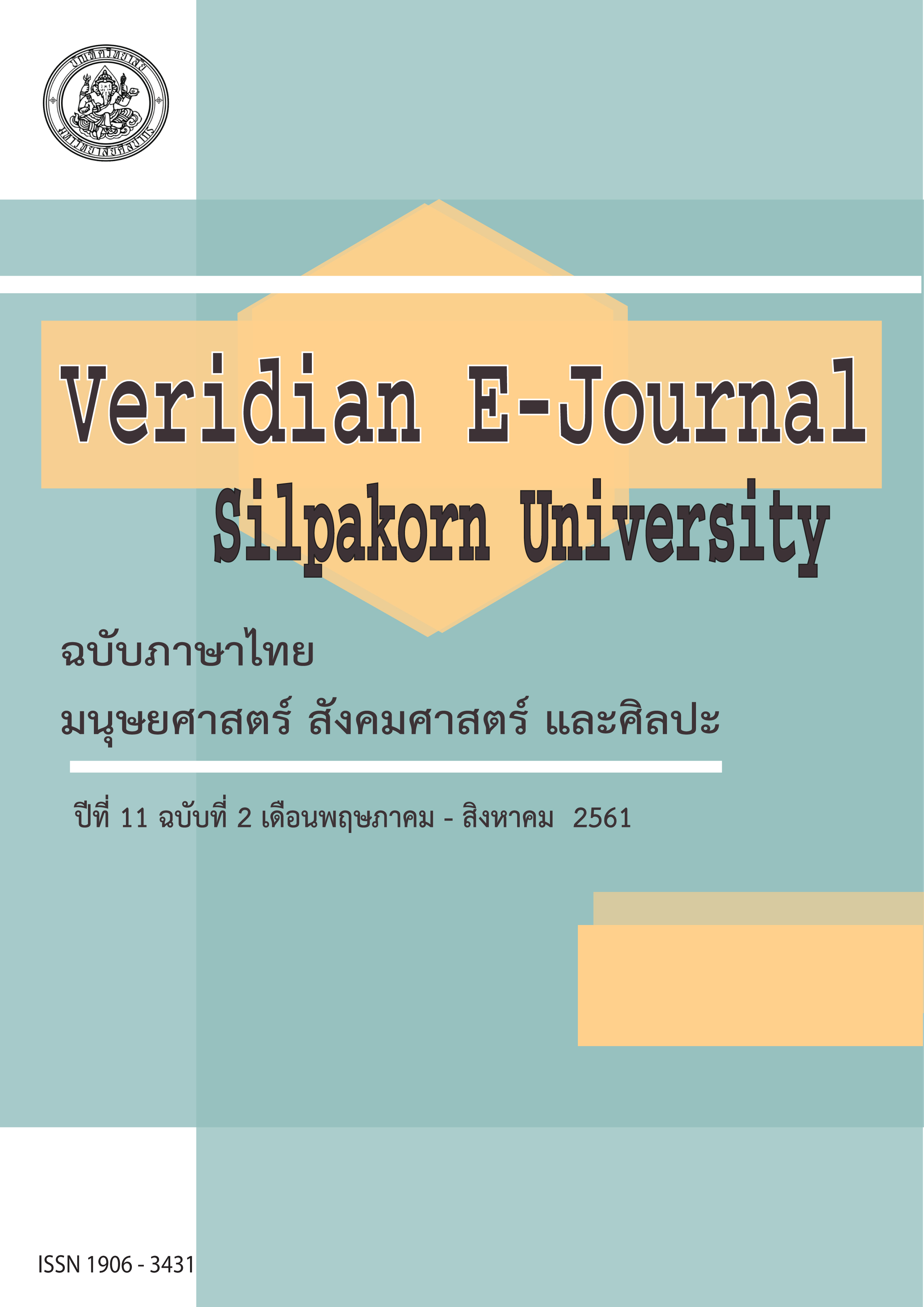การเชื่อมโยงวิธีวิทยาการสร้างทฤษฎีฐานรากสู่การวิจัยเชิงปริมาณ เพื่อการศึกษาวิจัยพฤติกรรมองค์การในยุคหลังนวสมัย (The linkage of grounded theory methodology to quantitative research methodology for organizational behavior studies in the postmodern era)
Main Article Content
Abstract
การศึกษาพฤติกรรมองค์การในยุคหลังนวสมัย เป็นการศึกษาพฤติกรรมของมนุษย์ในองค์การที่ผูกพันและผันแปรไปตามสภาพแวดล้อมและบริบทขององค์การที่มีการเปลี่ยนแปลงอย่างรวดเร็ว ยุคหลังนวสมัยเป็นยุคแห่งการเกิดปรากฏการณ์ใหม่ๆ ที่มีความแตกต่างไปจากเดิม มีมากกว่าหนึ่งสาเหตุ คลุมเครือและยากที่จะคาดเดาผลที่เกิดขึ้น และไม่แน่นอน การศึกษาพฤติกรรมองค์การโดยใช้วิธีการทางวิทยาศาสตร์ ที่มุ่งเน้นที่จะพิสูจน์ความสัมพันธ์เชิงเหตุและผล พิสูจน์สมมติฐานเพื่อยืนยันหรือหักล้างแนวคิดและทฤษฎีที่มีอยู่จึงมิอาจทำให้ผู้วิจัยเข้าถึงความรู้และความจริงเกี่ยวกับปรากฏการณ์ขององค์การได้อย่างลึกซึ้ง ประกอบกับปัญหาการวิจัยด้านพฤติกรรมองค์การนั้น มักเป็นปัญหาที่ประกอบด้วยตัวแปรนามธรรมจำนวนมาก ผู้วิจัยจึงต้องใช้ความพยายามและระเบียบวิธีวิจัยที่ลุ่มลึกในการศึกษาให้เกิดความชัดเจนให้มากที่สุด การวิจัยแบบผสมผสานวิธีตามแบบแผนการวิจัยแบบต่อเนื่องเชิงสำรวจ (Exploratory Sequential Design) จึงเป็นวิธีการที่ผู้วิจัยสามารถนำมาใช้ตอบคำถามการวิจัยเกี่ยวกับพฤติกรรมองค์การในยุคหลัง นวสมัยได้อย่างสมบูรณ์ครอบคลุมและชัดเจนมากยิ่งขึ้น เริ่มต้นด้วยการวิจัยเชิงคุณภาพโดยใช้วิธีวิทยาการสร้างทฤษฎีฐานรากในการค้นหาและสร้างตัวแปรนามธรรมด้านพฤติกรรมองค์การ ศึกษาเงื่อนไขความสัมพันธ์ของตัวแปร นำไปสู่การได้คำนิยามของตัวแปรต่างๆ ที่สอดคล้องกับบริบทขององค์การนั้นๆ ในลักษณะของทฤษฎีฐานราก ทำให้ได้แนวทางการสร้างเครื่องมือวัดตัวแปรจากสิ่งที่ไม่มีแนวคิดที่ชัดเจน และได้กรอบทฤษฎีที่มีที่มาจากข้อมูลเชิงประจักษ์ แล้วเชื่อมโยงโดยนำความสัมพันธ์ของตัวแปรในรูปแบบของสมมติฐานชั่วคราวไปใช้ในการศึกษาทดสอบในเชิงปริมาณ โดยพัฒนาเป็นเครื่องมือการวิจัย สร้างข้อคำถามในเครื่องมือวัดตัวแปรต่างๆ เพื่อนำไปทดลองและยืนยันผลสำรวจที่ได้ด้วยวิธีการทางสถิติ ทำให้ได้ตัวแบบการวัดตัวแปรเชิงพฤติกรรมศาสตร์ใหม่ๆ และสามารถยกระดับไปใช้ในการศึกษาที่มีขนาดใหญ่ขึ้นเพื่อให้สามารถอนุมานผลไปใช้ต่อในการศึกษาพฤติกรรมองค์การในวงกว้างได้ต่อไป
In postmodern management era, Organizational Behavior (OB) research is the study that precise to investigate in human behavior which colligate and vary on organizational environment and context that rapidly change. Postmodern era is the period of the emergent of new phenomena that different from the past, there are a lot of causes and effects, complicate and hard to forecast the effect of those phenomena. OB research in scientific methodology was emphasize on examine the causal relationship and hypotheses testing to confirm or confute existing concepts and theories, it cannot enough to encourage the researcher deeply approach knowledge and reality of organizational phenomena. In addition, the research problems in organizational behavior studies tend to be the problem that consist of elaborate constructs. The research have to use their effort and profound research methodology for clearness ad reliability of research results. The application of exploratory sequential design is one of mixed method research which the research can use to completely answer research questions about organizational behavior in postmodern era. The researcher begins with qualitative research by using grounded theory methodology to find and construct variables in OB, understand the condition of relationships’ constructs and bring to gain the definition of constructs which ground from empirical data and complementary with organizational context. Grounded theory research can make the researcher achieve the way to develop construct measurement model and the theoretical framework that come from empirical information. Furthermore, it can be linked to quantitative research, by forming working hypotheses and operational definition of the constructs to develop research tools and items of questionnaire for testing and confirming research results by statistical methods. Finally, the researcher will achieve the new measurement tools to use for studying the new constructs in OB and can be used to study in widely context for contribution in further OB researches.

